What to consider when purchasing a great mini excavator? There are many essential items to consider when purchasing a new mini excavator. Mini excavators are becoming the popular choice for various tasks in different construction. Many manufacturers come into the market to make mini excavators, such as Bobcat, John Deere, Hitachi, and some Chinese manufacturers like Hixen also offer high-quality products. They also manufacture an extensive range of time-saving attachments.
So if you want to purchase or rent, the most cost-effective first step is to find a reliable dealer. You can also find the right mini excavator manufacturer at the cheapest price. Also, be careful with these two aspects of dealer support and Service as we start restoring and increasing construction activity that will significantly help the national economic recovery. As a result, careful consideration will need to be made over any new machinery investment, particularly mini-excavators.
It has been imperative for builders to understand what factors to consider before committing to a mini-excavator purchase to ensure they get the maximum return on their investment. Below you can learn the things before What to consider when purchasing a great mini excavator?:
جدول المحتويات
تبديلVital Factors When Purchasing a Great Mini Excavator?
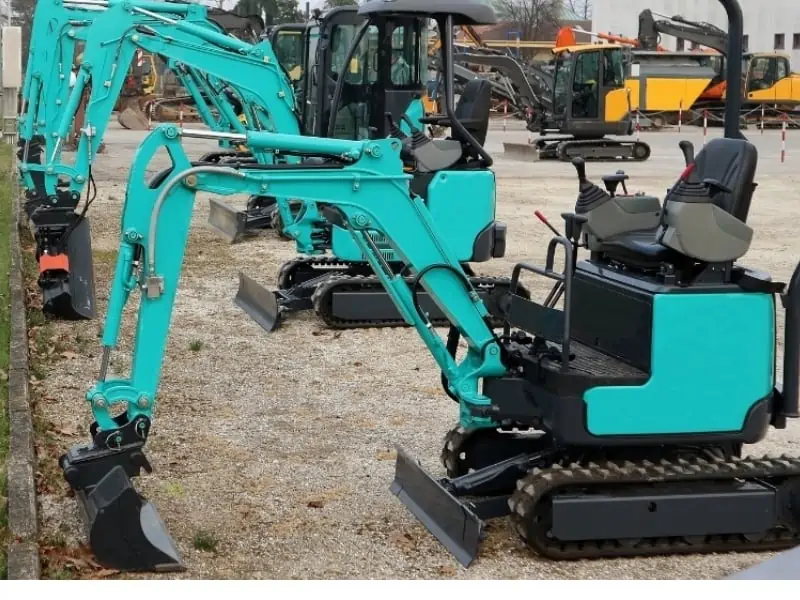
Versatility
Every project demands different from site to site. So What to consider when purchasing a great mini excavator? However, suppose you have a versatile machine that can meet any application’s needs. An excavator is a significant investment. It isn’t easy to anticipate what you have to do in future site needs, but it is essential to understand what mini-excavator performs best for the work.
There are some restricted movement on-site areas when working in and around pedestrian areas only accessible from indoors. Fortunately, the latest mini-excavators can quickly adapt to their environment using a retractable undercarriage. It has impressive features that allow you to operate it to retract the undercarriage for easy maneuverability through doorways, gates, or alleyways and then do it when they are ready to start work.
These micro diggers are smaller, so they can go anywhere. You can split excavators into two broad categories conventional or zero tail swing. So you can purchase zero tail swing if your project requires the tail stays within the general area of the undercarriage when facing forwards, significantly reducing the chance of damage to the machine’s rear end.
Service Level Agreement
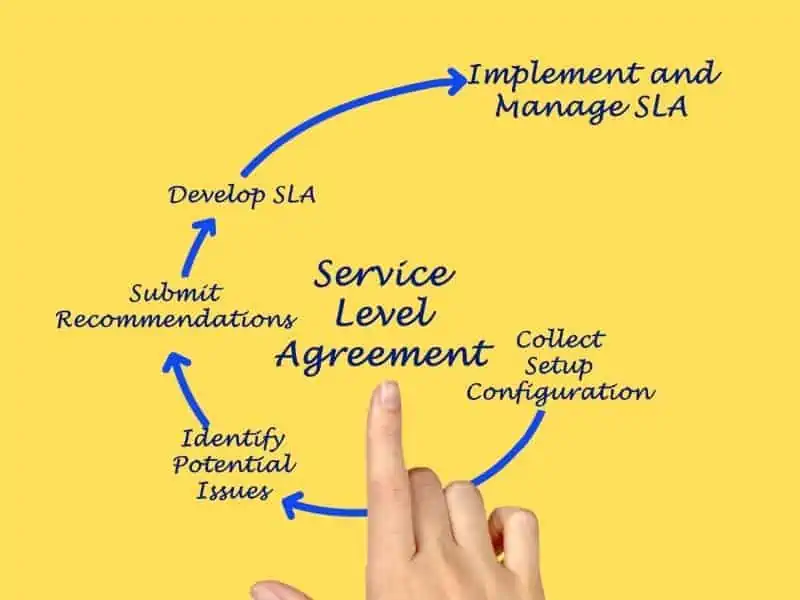
One significant point to consider is Service Level Agreement, in which sale support gives you a quality service level agreement. What is the most important factor to consider when purchasing a mini excavator? It also associates the contract with any emergency repairs and your routine maintenance schedule provided by the dealer or third-party technicians. This agreement includes the following: For customer support, the dealer you are considering does not provide customer support; check the SLA for a guarantee on response time.
It will look different from on your geographical location and size. The SLA also included specific parts used for routine service and repair listed in detail. It will catalog acceptable substitutions if the manufacturer’s preferred part is unavailable and include any fees and additional costs not covered under the service plan for parts and labor. The maintenance schedule the frequency of each type of maintenance on the mini excavator, including standard care, extended supervision, and comprehensive maintenance.
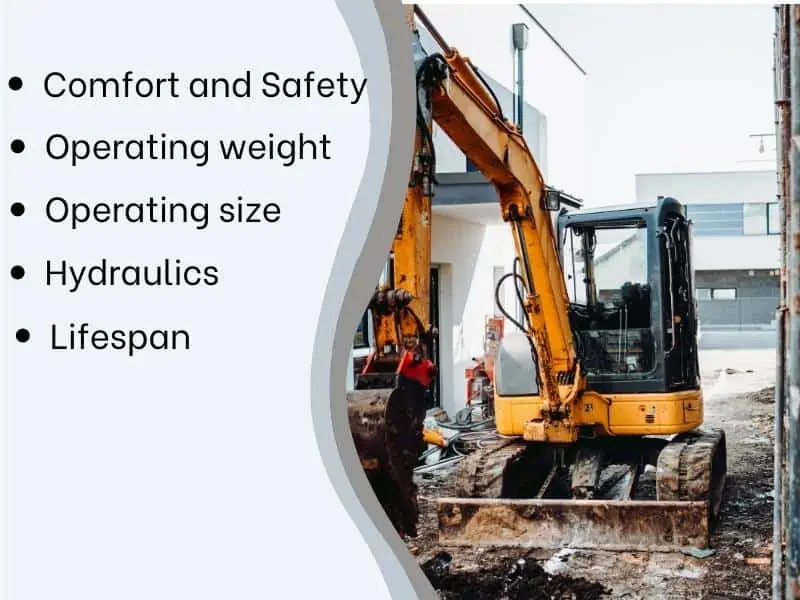
Operating Weight and Size, Application
It is imperative to match the suitable size machine to your tasks. What to consider when purchasing a great mini excavator? You can find crawler excavators in three size classes; compact or mini, mid-size, and standard or full-size. Since the mini excavator is small in size, it is best for congested areas, but before buying, you should know the applications, the spec requirements for the job, and what size machine you need.
Comfort and Safety
The mini excavator market continues growing, and manufacturers are also focusing on the comforts of operators who want all the comforts of larger excavators in these smaller diggers. So What to consider when purchasing a great mini excavator? A comfortable operator is always a productive operator. So you should keep in mind the design, floor area with ample leg and foot space, and space between the joysticks, so they do not contact the operator’s legs, limiting their stroke.
On top of a comfy workspace, you should keep an eye on safety features before buying. It would be best to keep an eye on rearview cameras; travel alarms are ideal when working around many people. If the mini excavator is equipped with a breaker, a cab machine will provide the operator with more excellent protection than a canopy.
Hydraulics
Before buying your small excavator, you should consider the attachments you have to work with and understand the hydraulic flows required for each. What to consider when purchasing a great mini excavator? When equipped, your excavator with the right mini excavator attachments will give you the versatility to return the most out of your investment.
Also, ask about the machine’s coupler options which will often help determine the scope and variety of attachments you can use with the device. Also, ask how the central hydraulic system boosts machine performance; D Series excavators feature the CASE Intelligent Hydraulic System (CIHS), a larger control valve, and new solenoid valves, which help boost breakout force, increase lifting strength and improve responsiveness, enabling the machine to work.
Lifespan and Operational Hours
The mini excavators have an operational lifespan of 10,000 hours on the high end. What to consider when purchasing a great mini excavator? These machines are heavily used with less than the recommended maintenance. Its repair starts around 8,000 hours of use. If you buy a used machine, give preference to those manufactured within the last three years and with less than 2,000 operating hours logged on their hour meter. These models come with modern technology, from 25% to 50% less, and new machines still have plenty of life left for full-time use.
Physical Inspection
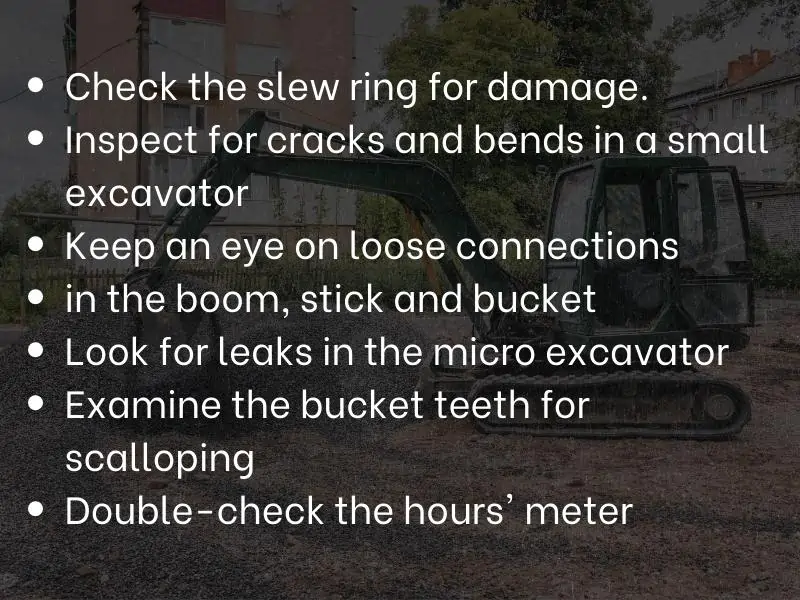
Physical inspection is an important factor for what to consider when purchasing a great mini excavator. If you are buying a used machine or a new one, then the inspection of the mini excavator is an essential factor when purchasing a mini excavator; keeping an eye on it involves more than just kicking the tires. Check that all connection points around the boom, stick, and bucket should be solid and free of movement. Keep tight pins and bushings, indicating the machine was adequately cared for and, more than likely, greased regularly.
Loose connections can lead to falls between the stick and the actual place of the bucket. There is no compromise on the Structural integrity of the mini excavators. Because if they have cracks, bends, or dents on the body of the machine are somehow acceptable. Some points for inspection are:
- Check the slew ring for damage.
- Inspect for cracks and bends in a small excavator
- Keep an eye on loose connections in the boom, stick, and bucket
- Look for leaks in the micro excavator
- Examine the bucket teeth for scalloping
- Double-check the hours’ meter
Options and Attachments
Another factor for what to consider when purchasing a great mini excavator is selecting options and attachments to create the perfect excavator for your operations. Suppose you need more reach, then look at excavators with a long-arm chance. The customers should be eligible to purchase their preferred machine size with a more extended arm for reduced repositioning and greater dig depth and reach. Long-arm options usually come with counterweight options for particular mini excavators.
There are many types of attachments, but implements are getting more high-tech and niche. For example, tilt rotators becoming in popularity over the last couple of years. These tools allow operators to tilt and rotate an attachment 360 degrees, offering versatility in various applications, including grading, general excavation, and material handling. Mini excavators are making big waves on job sites worldwide, especially in North America.
Furthermore, a traditional bucket, a thumb, is perhaps the most popular attachment. Thumbs are famous for cleaning up debris and pick-and-place tasks on landscape projects. A bucket and thumb combo allows operators to quickly clean up and load out trash and debris on a job site. They can also pick up and place heavy objects like stones and pavers. Augers and grapples are everyday purchases, and mulchers are gaining steam and allowing operators to clear unwanted bushes and small trees.
Controls
What to consider when purchasing a great mini excavator? Control is essential in many ways, such as control of new machines. Consider the needs of the operator when purchasing a new excavator. Most operators have a strong preference between ISO or SAE control patterns. To make things easier, many new excavator models offer an easy control selector that allows the operator to adjust the mini excavator to their preference.
Tracks and Undercarriage
You need to understand the many track options available because they can impact the machine’s productivity. What to consider when purchasing a great mini excavator? Most compact excavators come with rubber tracks designed to minimize surface damage during travel and operation in the residential area, street, and in-building.
But remember that rubber tracks wear out more quickly than steel, so a large variety of aftermarket track types are available with different widths and tread depths. Also, look for a rugged undercarriage that will make it easy to keep clean and maintain.
Types of Mini Excavators
What to consider when purchasing a great mini excavator? You have to know, Mini excavators come in two kinds of tail swing and zero-tail swing.
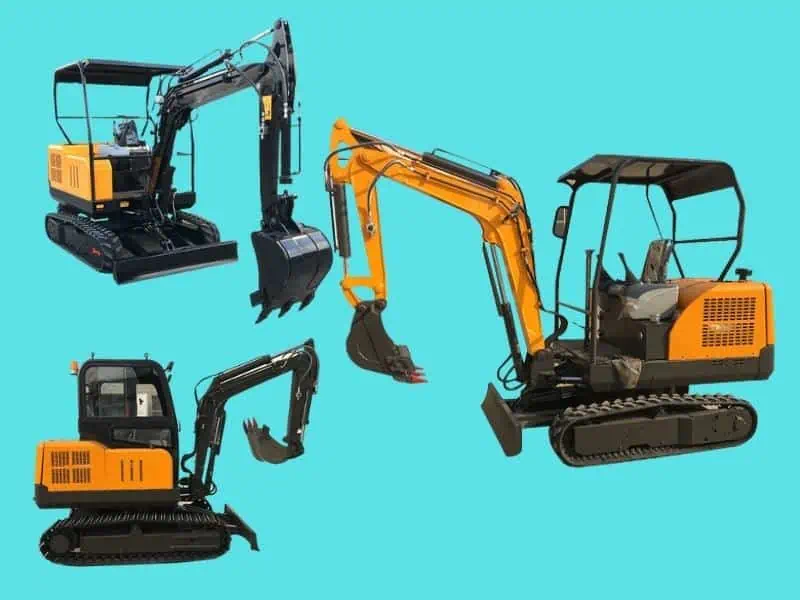
Tail Swing Excavators
- Conventional house models
- Come with a rear counterweight feature that stabilizes the excavator during operation.
- Offsets added weight to the bucket.
- The counterweight extends 6 inches or more beyond the width of the tracks so it can rotate during operation.
- The design will be problematic in tight work areas, particularly when turning and placing spoil.
- Tail swing excavators also have slightly roomier cabs, offering additional comfort and maneuverability to the operator.
- zero-tail swing excavators provide comparable levels of performance.
- Best to dig depth, reach, cutting height, and dump height.
- They are substantially easier to navigate in tight work areas.
- Zero-tail swing models have a counterweight that rotates within the width of the excavator’s tracks.
- The rotating balance makes them far more accessible to operate down corridors and alongside walls or other immovable barriers.
- It also provides an additional cost-saving benefit as ease of access.
Leading Brands
As briefly listed in the introduction, more than a dozen brands produce mini or compact excavators. What to consider when purchasing a great mini excavator? brands are important items to keep in mind. We’ve selected three of the most widely recognized examples of how they compare, where they focus their research and development, and the industries and applications they cater to.
Specifications
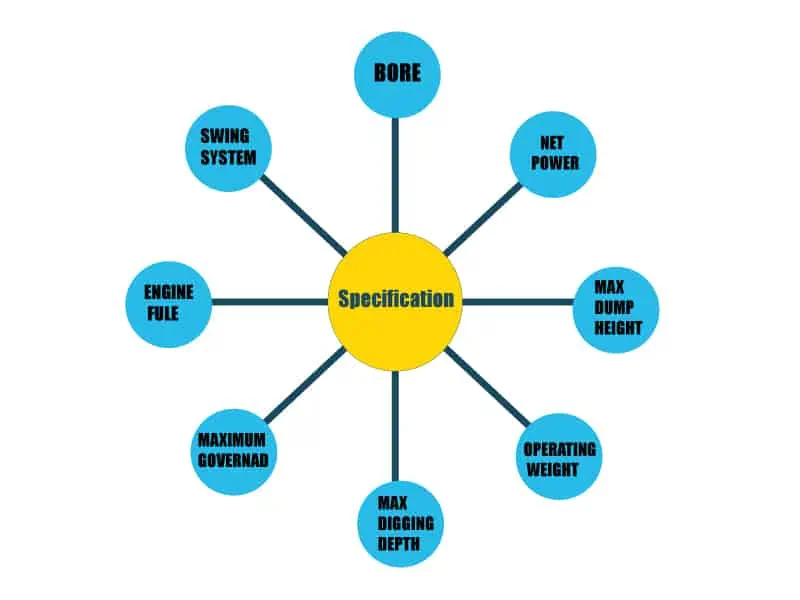
When are you buying a new mini excavator, What to consider when purchasing a great mini excavator? One of the primary factors to consider when purchasing a mini excavator is its digging depth, dump height, and operating weight. These three considerations almost always affect the type and size of a compact excavator. They directly impact the level of productivity on the job site. Before buying a particular model, pair your needs with the excavator’s capabilities to see how they match.
Here is a list of some specifications for consideration:
Bore
Average diameters of 3.7 to 4.5 inches in diameter for a mini excavator.
Net Power
Expect to find horsepower that ranges between 10 hp and 50 hp.
Swing System
Typical swing speeds are between 9.2 and 11 RPMs.
Degree of swing with 50° to 60° being standard on the right wing and 60° to 80° joint on the left.
Max Dump Height
Max dump heights extend from 6 to 13 feet.
Engine Fuel
Range from 2.6 gallons to 33 gallons depending on the size and output of the machine.
Maximum Governed
RPM for mini excavators is around 2200 RPM.
Max Digging Depth
Find max digging depths that range between 5.6 and 12 feet deep.
Operating Weight
Weighs between 2,000 and 18,500 lbs.
Tier 4 Solutions
What to consider when purchasing a great mini excavator? Today’s Tier 4 Final excavators are equipped with different engine and after-treatment technologies and the effects they can have on your operation. Knowing the differences is essential when making a purchasing decision. Selective Catalytic Reduction (SCR) technology lowers harmful emissions through a simple chemical reaction. SCR allows the engine to run at peak performance, giving a faster throttle response while maintaining lower temperatures and the best fuel efficiency. It also helps the engine run at lower temperatures, ultimately extending engine components’ service life. So it would be best if you asked your equipment dealer about the benefits and maintenance of the different Tier 4 Final engines.
Choosing a Quality Dealer or Brand
What to consider when purchasing a great mini excavator? When you purchase a mini excavator, the most crucial thing to consider is a quality dealer or brand because a good relationship with a quality dealer will be one of the most beneficial aspects of ownership. The professional dealers provide services and support through their service level agreement.
You can also find some good brands that offer you proper support through their service level agreement, such as caterpillar, Kubota, and more some chines Quality dealers or brands also come into the market; they get the confidence of their buyers and also get many quality certificates. Their level of support may grow your business – advising you on additional types and sizes of material handling equipment that could boost your capability and profitability in equal measure.
Every company will not buy a mini excavator because, for certain businesses, leasing a mini excavator may be more profitable, especially when contracted for long-term use. You may qualify for may be able to minimize your cost of ownership.
Reliability
Reliability is an essential factor to consider when purchasing mini excavator. What to consider when purchasing a great mini excavator? Operators should be on the lookout for the CE mark, denoting adherence to standards and upgrading to more reliable parts where possible; it essentially that to how much you trust the brand you are purchasing from, particularly in the current climate. Reliability is the total attention to detail taken at every stage of the manufacturing process, from materials to quality control.
End Up of What to Consider When Purchasing a Great Mini Excavator?
Whenever you plan to buy a new mini excavator or used excavator, this article will help you to find the answer to your question, “what to consider when purchasing a great mini excavator. Hixen offers you its services because they say”We can also provide mini excavators worldwide. The products mainly include Mini Excavators, Midi Excavators, Zero Tail Mini Diggers, Wheel Excavators, Backhoe excavators, Wheel loaders, etc.
The equipment is widely used in construction, farming, gardening, landscaping, and mining. The factory covers an area of more than 15000 square meters with a modern manufacturing workshop. In addition to our professional technical team, experienced workers, most advanced manufacturing equipment, and advanced management, the capacity can reach 2500 sets annually.
Besides the standard models of our product, we also provide OEM or ODM service for all clients. However, the quality of the products is of a high standard. For more details, contact us for asking quotes.
